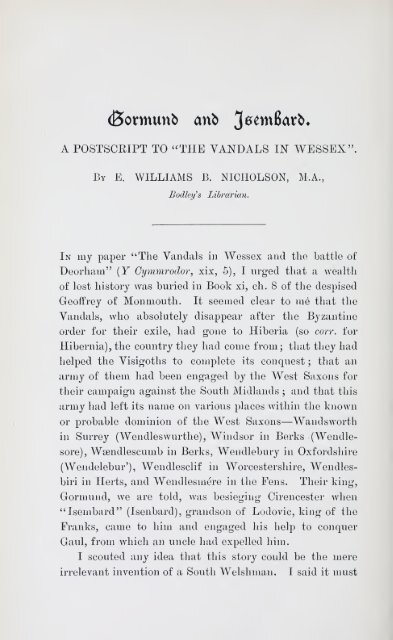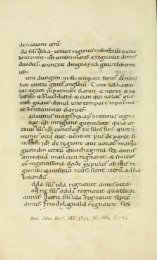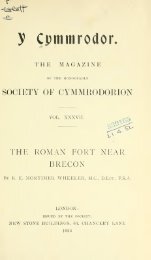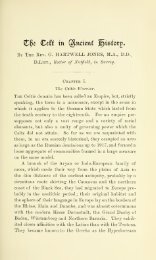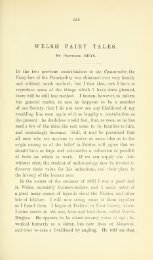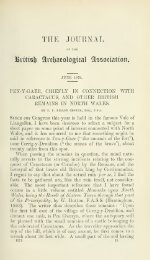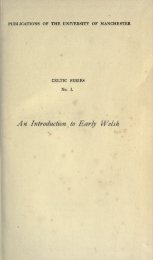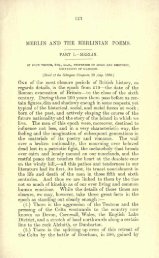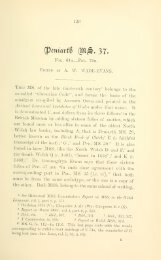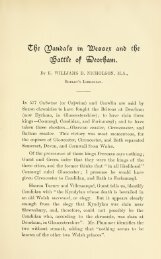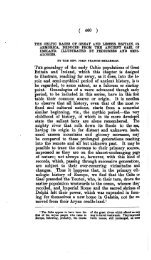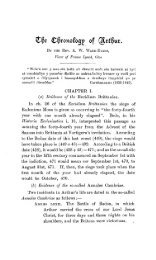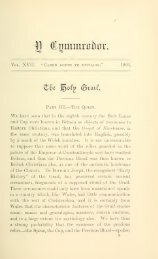Vandals in Wessex postscript (Gormund & Isembard) - Kingarthur ...
Vandals in Wessex postscript (Gormund & Isembard) - Kingarthur ...
Vandals in Wessex postscript (Gormund & Isembard) - Kingarthur ...
You also want an ePaper? Increase the reach of your titles
YUMPU automatically turns print PDFs into web optimized ePapers that Google loves.
(Bomunb anò '^Bmèatò.<br />
A POSTSCRIPT TO "THE YANDALS IN WESSEX".<br />
By E. WILLIAMS B. NICHüLSON, M.A.,<br />
Bodley^s<br />
Librarian.<br />
In my paper "The Yandals <strong>in</strong> <strong>Wessex</strong> and tlie battle of<br />
üeorham" (F Cymmrodor, xix, 5), I urged that a wealth<br />
of lost history was buried <strong>in</strong> Book xi, ch. 8 of the despised<br />
Geoíîrey of Monmouth. It seemed clear to mé that the<br />
Yandals, who absolutely disappear after the Byzant<strong>in</strong>e<br />
order for their exile, had gone to Hiberia (so corr. for<br />
Hibernia), the country they had come from; that they had<br />
helped the Yisigoths to complete its conquest that an<br />
;<br />
army of them had been engaged by the West Saxons for<br />
their campaign aga<strong>in</strong>st the South Midhmds and<br />
;<br />
that this<br />
army had left its name on yarious places with<strong>in</strong> the known<br />
or probable dom<strong>in</strong>ion of the West — Saxons Wandsworth<br />
<strong>in</strong> Surrey (Wendleswurtlie), W<strong>in</strong>dsor <strong>in</strong> Berks (Wendlesore),<br />
Wsendlescumb <strong>in</strong> Berks, Wendlebury <strong>in</strong> Oxfordshire<br />
(Wendelebur'), Wendlesclif <strong>in</strong> Worcestershire, Wendlesbiri<br />
<strong>in</strong> Herts, and Wendlesmére <strong>in</strong> the Fens. Their k<strong>in</strong>g,<br />
<strong>Gormund</strong>, we are told, was besieg<strong>in</strong>g Cirencester when<br />
"<strong>Isembard</strong>" (Isenbard), grandson of Lodovic, k<strong>in</strong>g of the<br />
Franks, came to him and engaged his help to conquer<br />
Gaul, from which an uncle had expelled him.<br />
I scouted any idea that this story could be the mere<br />
I said it must<br />
irrelevant <strong>in</strong>vention of a South Welshman.
Gormîcnd and Isenibard. i 5 i<br />
come from tlie Breton book' wbich Geoffrey declared he<br />
bad translated, and I sug-gested that with the besieged<br />
Britons at Cirencester was a Breton cont<strong>in</strong>gent, <strong>in</strong> whicb<br />
the Frankish refuo^ee Isenbard bad come.<br />
I am now able<br />
to 'rove that part, at least, of the story is anterior to<br />
— Geoíîrej, and of Gallic orig<strong>in</strong> abnost certa<strong>in</strong>ly, however,<br />
not Breton but Norman.<br />
Hariulf of St. Riquier wrote a chronicle of that abbey<br />
whieh lie.carried down to 1104. He left St. Riquier <strong>in</strong><br />
1105, to become abbat of Oudenbourg, where he died <strong>in</strong><br />
1143. Now, when his chronicle has anyth<strong>in</strong>g <strong>in</strong> comraon<br />
with Geoffrey, that cannot be horrowed, but must be prior<br />
to Geoffrey's book, because Hariulf left his cbronicle<br />
beh<strong>in</strong>d him' at St. Riquier — some quarter of a century<br />
before we have any reason to suppose that Geoffrey began<br />
to write. And <strong>in</strong> ch. 20 of his third book, he has a version<br />
of the story of <strong>Isembard</strong> and Gormond, which is not<br />
likely to have been written after 1088, when he fìnished<br />
hìsfourth book.<br />
A.ccord<strong>in</strong>g to Hariulf, a noble " Francigena", named<br />
Esirabardus, had offended Louis III ("Hludogvicus"), and,<br />
becom<strong>in</strong>g a traitor, <strong>in</strong>vited "gentium barbariem" to visit<br />
the country. Their ^<strong>in</strong>g, Guararaundus, said to have<br />
brought many k<strong>in</strong>gdoms under his rule, wished also to<br />
dom<strong>in</strong>ate France. The story of the <strong>in</strong>vasion was told not<br />
only <strong>in</strong> histories, but was the subject of daily rem<strong>in</strong>iscence<br />
and song among the people ("patriensium memoria<br />
quotidie recolitur et cantatur"). On tlie<br />
approach of the<br />
"barbari" the treasurer of St. Riquier took a box of<br />
valuables and fled to Sens. The enemy, after land<strong>in</strong>g-,<br />
marched through the prov<strong>in</strong>ces of Vimeu and Ponthieu,<br />
1<br />
In my list of <strong>in</strong>cidents exhibit<strong>in</strong>g the Breton element I ought to<br />
have <strong>in</strong>chided the procur<strong>in</strong>g of an overk<strong>in</strong>g from Brittany (vi, 4).<br />
2<br />
See Lot's ed., p. lvii.
152 <strong>Gormund</strong> and Isenibard.<br />
overthrew cliurches, killecl Christians, and filled everyth<strong>in</strong>g<br />
with death and blood, f<strong>in</strong>ally plunder<strong>in</strong>g and burn<strong>in</strong>o^ the<br />
church of St. Riguier.<br />
Louis III encountered the<strong>in</strong> <strong>in</strong> the Vimeu district, and<br />
obta<strong>in</strong>ed a triumph, the k<strong>in</strong>g of the <strong>in</strong>fidels, Guaramund,<br />
be<strong>in</strong>g killed. Thousands of his people were sla<strong>in</strong> and the<br />
rest put to ílight. Louis, however, died, it was said from<br />
an <strong>in</strong>ternal rupture caused by<br />
tlie over-violence of his<br />
blows.<br />
Now it is clear that if Hariulf's data are correct<br />
Geoffrey's cannot be ; but, on e^am<strong>in</strong><strong>in</strong>g- Hariulf, his<br />
account turns out to be a composite one, partly derived<br />
from the Francorum regum historia (which he quotes<br />
verhatim), partly from tlie tradition of the monastery as<br />
to the fliglit of its treasurer and the plunder and destruction<br />
of its build<strong>in</strong>gs, and as to other particulars from an<br />
unnamed source.<br />
Well, the purely monastic part of the account does not<br />
mention Esimbard, Louis, or Guaramund. And the<br />
Fraìicorum regum historia does not mention Esimbard or<br />
Guaramund, nor does it allude to the death of Louis as <strong>in</strong><br />
any way connected with the battle. Yet the account <strong>in</strong><br />
that work was written <strong>in</strong> 886-7, only some five or six<br />
years after Louis defeated the <strong>in</strong>vaders. Let me add that<br />
Louis did not die till the year after tlie battle, and that<br />
the cause of his death was quite different. It is noticeable<br />
too that the F.r.h. says tlie <strong>in</strong>vaders were Normans,<br />
and tliat Hariulf does not.<br />
Tliere is<br />
<strong>in</strong> the Royal Library at Brussels a fragment<br />
of a French verse-romance on tlie subject (MS. II, 181).<br />
The MS. is of the 13th century. It was reproduced <strong>in</strong><br />
1906 <strong>in</strong> facsimile, with a transcription by Dr. Alphonse<br />
Bayot, and a bibliography. This romance (through wliich<br />
I came to learn the existence of the legend of Hariulf)
<strong>Gormund</strong> and <strong>Isembard</strong>. 153<br />
calls <strong>Gormund</strong> or Gorraunt an Arabian and an Oriental,<br />
but tliere is no evidence that it was not composed after,<br />
and partly based on, Geoffrey's account.<br />
Of tlie books and articles mentioned <strong>in</strong> the bibliography,<br />
the most important<br />
is an article by M. Ferd<strong>in</strong>and Lot <strong>in</strong><br />
Romania, xxvii, pp. 1-54 (1898) but he attributes the<br />
;<br />
composition of the verse-romance to 1060-70, which would<br />
make it impossible for it to have borrowed from Geoffrey,<br />
<strong>in</strong> spite of its mention of "Cirencestre". On the other<br />
hand, M. Gaston Paris ìn Romania, xxxi, pp. 445-8 (1902),<br />
review<strong>in</strong>g a Swedish authoress who places the poem <strong>in</strong><br />
the late 12th or ]3th century, shows that, on account<br />
of an allusion to the k<strong>in</strong>g as feudatory of St. Denis, it<br />
cannot have been written hefore<br />
1082' ;<br />
and, while deny<strong>in</strong>g<br />
that it is so late as the end of the 12th century, says<br />
one can cont<strong>in</strong>ue to place it towards the end of the first<br />
third of that century. Now Geoffrey's book was at Bec<br />
<strong>in</strong> Normandy <strong>in</strong> January 1139, and how much earlier we<br />
cannot tell :<br />
M. Paris gives no reason why the poem should<br />
not be at least as late as that.<br />
"<strong>Gormund</strong>", and connected with the<br />
In my paper I preferred the read<strong>in</strong>g "Godmund" to<br />
<strong>in</strong>vader Godmundcestre<br />
and Godmundesleah. That must be given up, <strong>in</strong><br />
face of Hariulf's Guaramundus.<br />
The reader will probably have begun to wonder whether<br />
there is any truth <strong>in</strong> Geoffrey's story so far as it relates to<br />
the 6th century, and, if so, whether there were any<br />
Yandals concerned at all. That question I ani not go<strong>in</strong>g<br />
to shirk, but we shall be <strong>in</strong> a better position to discuss it<br />
^<br />
He th<strong>in</strong>lís Louis VI was the first to recognise formally this<br />
feudal bond : <strong>in</strong> 1124: that k<strong>in</strong>g made open declaration of it, and<br />
"raised" the banner of St. Denis for the first time.
154 <strong>Gormund</strong> and <strong>Isembard</strong>.<br />
when we have cleared out of tlie<br />
way those elements which<br />
are certa<strong>in</strong>ly later.<br />
Geoffrey has mixed up two foreign encampments at<br />
Cirencester. The first was that of the West Saxons <strong>in</strong><br />
577. The second was that of the Dane Guthrura or<br />
Guthorm, who, after mak<strong>in</strong>g peace with ^lfred, lay with<br />
his host at Cirencester <strong>in</strong> 879, retir<strong>in</strong>g <strong>in</strong> 880 to his k<strong>in</strong>gdom<br />
of East Anglia, and dy<strong>in</strong>g <strong>in</strong> 890.<br />
In 879 another Danish host came to England, but <strong>in</strong><br />
880 left for Ghent, where it lay for a year, and <strong>in</strong> 881 had<br />
a battle with the Franks. That may be the victory ga<strong>in</strong>ed<br />
at Saucourt by Louis III, or it<br />
may be the one <strong>in</strong> the<br />
Vimeu district. There is no record that Guthorm came<br />
from East Anglia to jo<strong>in</strong> the <strong>in</strong>vaders, but there is no<br />
proof that he did not. And it is ma<strong>in</strong>ta<strong>in</strong>ed that his name<br />
might be short^ned to Gorm and Lat<strong>in</strong>ized tö Gormo,<br />
which would become <strong>in</strong> French Gormon. I cannot see<br />
that any evidence has been produced of Gorm as an<br />
abbreviation of Guthorm. I will, however, add on my<br />
own account that the th would eventually disappear <strong>in</strong><br />
French, so that we might have Guorm-on, and apparently<br />
that might happen as early as the time when Hariulf<br />
wrote.<br />
But there is another name out of whicli it is quite<br />
have arisen. The Annales<br />
truly said that Gurmond may<br />
Bert<strong>in</strong>iani show that <strong>in</strong> 882 there was among the Normans<br />
on the cont<strong>in</strong>ent a pr<strong>in</strong>ce named Vurm-o (dat. Vurmoni).<br />
The Annales Fuldenses call<br />
him Vurm, and of course his<br />
name was the Scand<strong>in</strong>avian Wurm (also Worm ?) i.e.<br />
Snake (our "worm"). Now <strong>in</strong> those parts of France<br />
where Kymric was tlie orig<strong>in</strong>al vernacular Teutonic W-<br />
became Gu- and G so that Wurm-o-n would produce<br />
* Under tho <strong>in</strong>fluence of the sanio souiul-change <strong>in</strong> Kymric, which<br />
toolt place not before the 8th contury, perhaps oven <strong>in</strong> the early
Gorniuna and Isenibara. 155<br />
Gurmon. And it is suggested that the Gurmond of the<br />
French romance is a compound of this Wurm and of<br />
Guthorm.<br />
M. Lot says that Geoffrey must have been <strong>in</strong> Normandy<br />
<strong>in</strong> and before 1128^ as chapla<strong>in</strong><br />
to Guillaume<br />
Cliton, i.e. William, son of duke Eobert of Normandy.<br />
If so, he would naturally visit St. Riquier and hear the<br />
Guaramund story there. When he got back to Englaud<br />
and came to write his "History", he obviously confused<br />
the capture of Cirencester by<br />
the encampment of the Danes <strong>in</strong> 879.<br />
the West Saxons <strong>in</strong> 577 and<br />
And here the question arises, "How comes Geoffrey to<br />
be so <strong>in</strong>terested <strong>in</strong> Cirencester, or to know anyth<strong>in</strong>g about<br />
the siege of 577"? He shows no sign of hav<strong>in</strong>g consulted<br />
an Anglo-Saxon chronicle : if he had, he would<br />
liave known that Bath and Gloucester were captured <strong>in</strong><br />
the same year, and would hardly liave omitted to name<br />
theiii. Moreover, :—<br />
<strong>in</strong> liis poem<br />
011 Merl<strong>in</strong> he makes the<br />
latter prophesy<br />
Hunc Itipus aequoreus debellans v<strong>in</strong>cet et ultra<br />
Sabr<strong>in</strong>am victum per barbara regna fugabit.<br />
Idem Kaer Keri'- circumdabit obsidione<br />
Passeribusque domos et moenia trudet ad imum.<br />
Classe petet Gallos, sed telo regis obibit.<br />
Here we have three new facts (1)<br />
that the <strong>in</strong>vader<br />
captured tlie town by means of sparrows (wliich, later<br />
9th. In those French dialects <strong>in</strong> which W- reraa<strong>in</strong>s, the Keltic<br />
yernacular was doubtless Goidelic— see the map <strong>in</strong> my Reltic<br />
Researches, at p. 113. Hariulf himself used G- forms, as <strong>in</strong> Gualaricus<br />
for Valery, and even <strong>in</strong> the middie of a word, as Illudogvicus {-gui-).<br />
1 The Dict. of Nat. Biorj. is silent about this chapla<strong>in</strong>cy, and M.<br />
Lot gives no authority.<br />
2 i.e. Cirencester. Either we should read Ceri=Cer<strong>in</strong> (Cor<strong>in</strong>ium),<br />
or at any rate that must have been aii earlier form. Note that here<br />
he seems to make the <strong>in</strong>vader capture the city aftei- driv<strong>in</strong>g the<br />
British k<strong>in</strong>g across the Severn.
156 Gornnmd and <strong>Isembard</strong>.<br />
writers expla<strong>in</strong>, was by iiiak<strong>in</strong>g tliem carry fire), (2) that<br />
he did accept <strong>Isembard</strong>'s <strong>in</strong>vitation, (3) that he was lcilled<br />
by the French k<strong>in</strong>g'. The last two he would naturally get<br />
from France, but whence his sparrows except from local<br />
tradition ?<br />
When his lord, William of Normandy, nephew of<br />
Henry I, died <strong>in</strong> 11 28, he came to England, and <strong>in</strong> or<br />
about 1129 signs the foundation-charter of Oseney Abbey,<br />
just outside Oxford. Whether he was one of the canons<br />
who served it is unknown, but some residence <strong>in</strong> the<br />
neighbourhood seems to have orig<strong>in</strong>ated his statement<br />
that Oxford was a prae-Saxon town bear<strong>in</strong>g- the nanie<br />
Ridichen, i.e. Ford of Oxen. Just then, the Abbey of<br />
Cirencester was founded by Henry<br />
I and served by canons,<br />
and I suggest that Geoffrey was one of them. There was<br />
a special reason why he should desire to go West : it<br />
would br<strong>in</strong>g him nearer to his dead patron's father, duke<br />
E-obert, who was <strong>in</strong> the custody of<br />
Robert of Gloucester,<br />
and nearer to Robert himself, who was the k<strong>in</strong>g's son<br />
and a man of great political importance,<br />
and who had<br />
the "History" dedicated to him later on.<br />
And now why should not what I call the Vandal part<br />
of tlie story be simply an element <strong>in</strong> the confusion ?<br />
Why<br />
should Geoffrey's "Africans" and "Hibernia" conceal any<br />
reference to the Yandals and Hiberia ?<br />
Why should they<br />
not be borrowed from the French romance, which calls the<br />
<strong>in</strong>vader an Arab, and speaks of his hav<strong>in</strong>g troops from<br />
Ireland ? Surely tliis is the simple and only natural<br />
explanation ?<br />
Well, the French romance Si3eaks<br />
of "Cirencestre" as<br />
be<strong>in</strong>g <strong>in</strong> the <strong>in</strong>vader's countries, and the probability<br />
is<br />
enormous that it was borrow<strong>in</strong>g from Geoffrey, and not<br />
vice verm. Tliere is not a trace of Cirencester, Africans,<br />
or Ireland <strong>in</strong> Hariulf, and noth<strong>in</strong>g would <strong>in</strong>duce me to
Gonnitnd and <strong>Isembard</strong>. 157<br />
admit that these features <strong>in</strong> the romance are noi borrowed<br />
from Geoffrey except the proof (which has not been, and I<br />
believe cannot be, given) that the romance was anterior to<br />
him.<br />
Putt<strong>in</strong>g that theory aside, I should stiU be will<strong>in</strong>g to<br />
admit that the Africans and "Hibernia" mùjìú be blunders<br />
or even <strong>in</strong>ventions of Geoffrey's, but there is Careticus :<br />
where does ìie come from ? Well, I am prepared, if need<br />
be, to jettison<br />
him too ! But the story that the Saxons <strong>in</strong><br />
their attack on Cirencester were aided by foreign mercenaries,<br />
and the idea that those mercenaries were Yandals, is<br />
too complete an explanation of hitherto unexpla<strong>in</strong>ed facts<br />
for me <strong>in</strong> the present state of my knowledge<br />
to abandon<br />
ìliaì.<br />
Wliy are there these 7 Wendel names on the map of<br />
England ? Why are they apparently conf<strong>in</strong>ed with<strong>in</strong> the<br />
limits of ancient <strong>Wessex</strong> ? Why are there no such names <strong>in</strong><br />
parts of <strong>Wessex</strong> hnown to have heen conquered hefore 568, or<br />
<strong>in</strong> the later <strong>Wessex</strong> conquests of Somerset, Devon, and Cornwall<br />
?<br />
Why, <strong>in</strong> fact, are they limited to regions conquered<br />
<strong>in</strong> the last third of the 6th century ?<br />
The prefix Wendel- is g-iven to a cliff, a combe, a<br />
"mére", an or (boundary), a-worth (dwell<strong>in</strong>g),<br />
and two<br />
hury^s (forts). There is no Anglo-Saxon common substantive,<br />
adjective, or verb to expla<strong>in</strong><br />
it. Also <strong>in</strong> six of<br />
the seven <strong>in</strong>stances it is <strong>in</strong> the genitive s<strong>in</strong>gular<br />
— a virtual<br />
proof that it is a proper name. Yet there is no Anglo-<br />
Saxon person-name Wendel— except <strong>in</strong> the compounds<br />
Uendilbercht, Wendelbeorht, Weudelgser (Yendelgerh),<br />
and Wendelburh, each of them found once only.<br />
So that there seems to me a quite dist<strong>in</strong>ct balance of<br />
probability that tlie West Saxons did import Yandals.<br />
Whether they came from Hiberia ["Hibernia"] we do not<br />
know. Nor their leader's name. And the legend that<br />
<strong>Gormund</strong>, after tak<strong>in</strong>g Cirencester, conquered other parts
158 Gonnund a^id <strong>Isembard</strong>.<br />
of the isle probably refers to Guthor<strong>in</strong> aiid iiot to the<br />
Yandal leader with whom Geoffrey confounded h<strong>in</strong>i : for<br />
Guthorm went from Cirencester to East Anglia, and<br />
regularly occupied that.<br />
"Careticus", who fled <strong>in</strong>to Wales, rema<strong>in</strong>s <strong>in</strong> doubt.<br />
Was that really the name of the chief British k<strong>in</strong>g, or is<br />
it as absolute an <strong>in</strong>yention as the names of most of<br />
Geoffrey's prae-Roman k<strong>in</strong>gs ? The Harleian Genealogies<br />
do not mention him ; but, unless any family descended<br />
from him survived until the lOth century, or near it,<br />
they would not be likely to do so. They mention neither<br />
the great Arthur (who of course left no sons) nor<br />
Ambrosius Aurelianus (who certa<strong>in</strong>ly had some descendants<br />
liv<strong>in</strong>g <strong>in</strong> 54.8). There is <strong>in</strong> another Welsh genealogy'<br />
a "Ceredic", belong<strong>in</strong>g to one of the chief royal l<strong>in</strong>es of<br />
Wales, who would suit perfectly as to date. He was son<br />
of Ceneu (weakened from Lat. Caniö),<br />
son of Corun<br />
(=Lat. Corönius), son of Ceretic, or Karedig, earliest of<br />
the k<strong>in</strong>gs of Cardigan, and son of Cunedag. Ceretic and<br />
Careticus are weakened umlaut forms of an earlier<br />
Caratic(us), derived from the carato stem, but not to be<br />
confounded with Caratâcus, Caratauc, with which their<br />
phonetics are quite irreconcilable.<br />
"Careticus" came to his overk<strong>in</strong>gship, accord<strong>in</strong>g to<br />
Geoffrey, on the death of Maelgwn. Maelgwn died <strong>in</strong> or<br />
about 548, and, as Ceredic was a generation further off<br />
from their common ancestor Cunedag, that exactly squares<br />
with probability. He may conceivably be the Ceretic<br />
whose death is recorded at [616] by the Aunales Cambriae,<br />
and who is just too early to be "Certic" of Elmet. In<br />
^<br />
See Y Cyìnmrodor, viii, 90 (no. xlix). corrected by vii, 133. I get<br />
this through Mr. A. Anscombü's iiidux <strong>in</strong> Archiv. f. helt. Le.ric, iii,<br />
71-2.
<strong>Gormund</strong> and <strong>Isembard</strong>. 159<br />
tliat case he must liave died at a very great age, and must<br />
have been unusually young-when chosen overk<strong>in</strong>g: I merely<br />
throw out the suggestion as a bare possiblity. It seems<br />
equally likely<br />
that the man whose death is recorded <strong>in</strong><br />
[616] was not this Ceredic but his great-grandson<br />
"Caredic".


